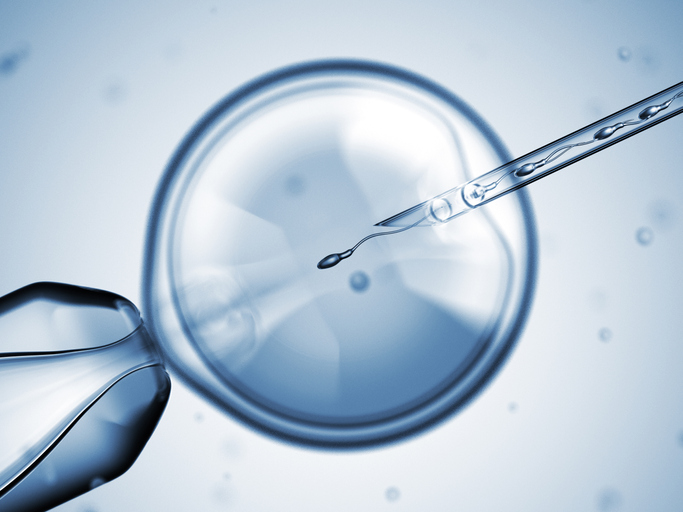Infertility in men
Male infertility is when a sexually active man who isn’t using any contraception finds his partner isn’t pregnant after 12 months of regular sex. More than 80% of couples usually conceive within a year if the woman is aged under 40 years and they have regular sex without contraception.
Problems conceiving can also be the result of female infertility, but in around 30% of cases, problems conceiving can be traced to male infertility. Some 25 per cent of couples are never able to pinpoint why they can’t conceive. This is known as unexplained infertility.
More men than ever are finding out they have issues with fertility – and more people are now talking about it, so don't feel you can’t. Instead, get the help you need.
Here, we give you the lowdown on what you need to know.
What are the symptoms of infertility in men?
There are often no symptoms of male infertility apart from being unable to achieve a pregnancy after at least 12 months of trying.
However, in some cases, you may have the following symptoms:
- sexual problems such as trouble getting or keeping an erection (erectile dysfunction), ejaculation problems or a low sex drive (libido)
- pain, a lump or swelling around your testicles
- abnormal breast growth (gynaecomastia)
- a low sperm count (oligozoospermia)
What causes male infertility?
For almost half of men with infertility, there isn’t an obvious cause. Even so, there are 5 key issues to consider.
1. Poor lifestyle and general health can cause male infertility
- obesity. Increased weight in men has been associated with a lower testosterone level, poor sperm quality and reduced fertility compared to men with a healthier weight. The odds of infertility increase by 10% for every 9kg (20 pounds) of extra weight. You should aim for a body mass index (BMI) of 20-25
- smoking. Smoking appears to reduce the likelihood of conceiving. Try to quit if you smoke to improve not only your chances of conceiving, but also your general health
- wearing tight-fitting underwear. There’s some evidence that tight underwear – which increases the temperature of the scrotum – can affect male fertility. Wearing loose-fitting underwear such as boxer shorts may be better if you are trying for a baby
- excessive alcohol consumption. This is known to affect fertility. There’s no evidence that drinking within recommended limits has an impact
- using anabolic steroids, marijuana or cocaine can significantly lower male fertility
2. Some medications can affect male fertility
Some prescribed medications can also adversely affect male fertility.
Examples include:
- alpha-blockers, which are often used for treating high blood pressure or the effects of an enlarged prostate gland
- 5-alpha-reductase inhibitors, which are often prescribed to help shrink an enlarged prostate gland and improve the flow of urine in benign prostate enlargement, as well as for treating hair loss
- some antidepressants
3. Semen quality issues can cause male infertility
One common cause of male infertility is poor-quality semen (the fluid or cum ejaculated during sex). There may be low sperm levels or no sperm at all, sperm that do not move properly or abnormally shaped sperm.
4. Testicle problems can affect male fertility
Problems with your testicles (scrotum), where sperm is made and stored, can also affect fertility. This can be due to a number of reasons, including:
- infection
- cancer of the testicles
- previous surgery
- an undescended testicle
- injury
- a testicle problem at birth (a congenital problem)
There may also be a varicocele present. A varicocele is an enlargement of the veins within the loose bag of skin that holds your testicles. It’s similar to a varicose vein you might see in your leg. Varicoceles can be associated with fertility problems as they can affect sperm production and quality, although almost two-thirds of people with a varicocele have no problems conceiving.
5. Low testosterone levels can cause male infertility
A less common cause of infertility in men relates to very low levels of testosterone (the male sex hormone that’s needed to make sperm). This is known as hypogonadism and can be the result of:
- taking drugs such as cannabis, cocaine and heroin
- tumours
- a condition called Klinefelter syndrome, where a man has an extra female chromosome
How is male infertility diagnosed?
Most men who experience problems with infertility usually have normal sexual function and pass routine physical examinations.
The diagnosis of male infertility is therefore based on 2 semen tests 1 month apart. The specimen is collected after the patient has not ejaculated (cum) for at least 2 days, but no longer than 5. Samples are collected through masturbation. Lubricants and condoms should not be used during the collection process in case they affect the sample.
An abnormal semen sample may show:
- no sperm at all (azoospermia)
- low levels of sperm (oligozoospermia)
- abnormal sperm
- sperm that doesn’t move as it should
- no ejaculate at all (aspermia)
If low sperm counts are found, blood tests may be taken to check hormone levels, including follicle-stimulating hormones (FSH), testosterone and prolactin. An increased level of FSH combined with low testosterone is a sign of testicular failure. An increased prolactin level may be due to a pituitary tumour. In that case, an MRI scan of the brain may be required.
Read more about male fertility tests.

How is male infertility treated?
The aim of male infertility treatment is to achieve a pregnancy.
Depending on the cause, hormonal treatments and surgery may be used to clear blockages affecting sperm movement in the testicles. An exception is varicoceles – treating these with surgery as a form of fertility treatment is no longer recommended as it doesn’t improve pregnancy rates.
If you’re producing no sperm at all or if other treatments fail, you could consider using donor sperm.
What’s the outlook for male infertility?
The outlook for male fertility depends on the diagnosis and cause. Some cases of male infertility can be cured. In others cases, medical and surgical treatments may not help. As a result, treatments such as artificial insemination using donor sperm could be an option for you. It’s worth noting that male infertility is believed to be increasing in the Western world.
Your health questions answered
Should I do a home kit to test my sperm levels?
 Answered by: Dr Roger Henderson
Answered by: Dr Roger HendersonAlthough home test kits for sperm are available, but they have not been extensively researched. Some home kits classify a low sperm count as under 20 million sperm per millilitre of semen, but international guidelines state that above 15 million sperm is normal. Some may also only check the number of sperm, but not other factors that can affect fertility, such as how well the sperm are able to move (motility) or how they’re shaped. If you do choose to use a home kit, it's best to use one that measures both these things. Even so, it’s better to see your doctor to arrange a test.
What’s a ‘normal’ sperm count?
 Answered by: Dr Roger Henderson
Answered by: Dr Roger HendersonYour chances of getting your partner pregnant decrease with decreasing sperm counts.
- Normal range – 15 million to greater than 200 million sperm per millilitre of semen
- Low – fewer than 15 million sperm per millilitre or less than 39 million sperm total per ejaculate
- None – some men have no sperm in their semen at all - known as azoospermia and a complete lack of sperm occurs in about 10-15 % of men who are infertile
Can cancer treatment affect male fertility?
 Answered by: Dr Roger Henderson
Answered by: Dr Roger HendersonThis depends on the type of cancer you have – not all men become infertile after cancer treatment. Any impact that cancer treatment may have on your fertility depends on the type and dose of chemotherapy or radiation treatment, whether you’ve had surgery (especially if it’s needed in the pelvic or testicular area), your age and your level of fertility before treatment. Some cancer drugs may also be more likely to cause infertility than others. This means that your fertility may be affected temporarily and recover after your treatment is finished, or the effect may be permanent. Before you start your treatment, your doctor will discuss any possible effects on fertility with you and may discuss collecting and storing your sperm before starting treatment.
Key takeaways
- infertility is the inability of a sexually active couple who are not using contraception to become pregnant after 12 months of trying
- infertility may be due to problems with 1 or both partners
- poor general health and lifestyle can affect male fertility
- the diagnosis of male infertility is based on 2 semen tests 1 month apart
- treatment depends on the diagnosis – some causes of male infertility are curable, while others are not






